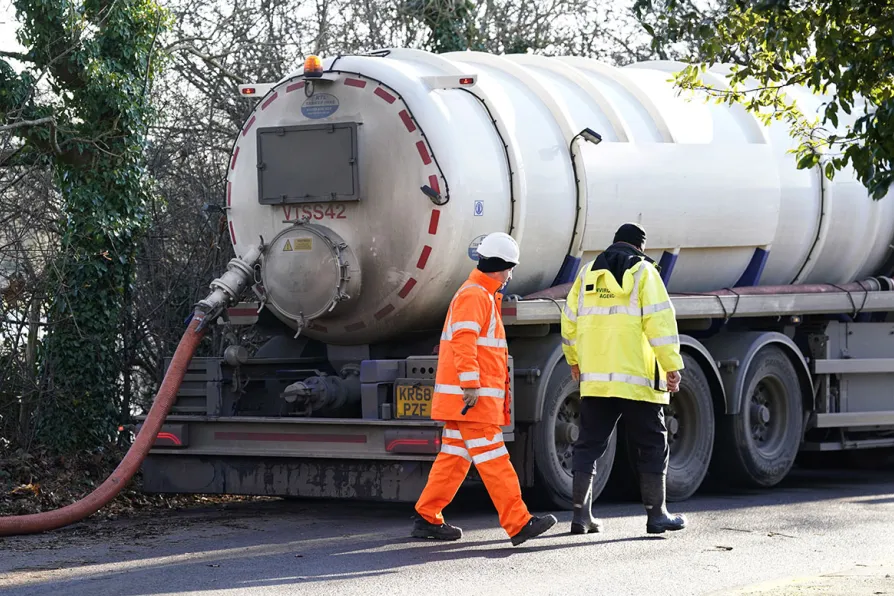
 A tanker pumps out excess sewage from the Lightlands Lane sewage pumping station in Cookham, Berskhire which flooded after recent heavy rainfall, January 10, 2024
A tanker pumps out excess sewage from the Lightlands Lane sewage pumping station in Cookham, Berskhire which flooded after recent heavy rainfall, January 10, 2024
THE Water Commission’s interim review is a “sham” and “reads more like a sales pitch” to investors, campaigners warned today.
The commission, led by Sir Jon Cunliffe, a former deputy governor of the Bank of England, said it had been tasked to focus on reforms to “improve the privatised regulated model.”
The report clarified it would “not make recommendations specific to any individual water companies.”
Instead, the commission urged the industry to “attract investors seeking low-risk, low-return investment,” which would require “restoring confidence in the stability and predictability of the regulatory system.”
Among its ambiguous recommendations, it suggested that regulators take a “supervisory approach,” akin to the financial services sector, to earlier identify issues.
It called the current legislative framework “complex” and recommended that it be simplified to “clarify lines of responsibility” to give regulators “flexibility” which could support “innovation.”
The report also called for an “infrastructure resilience framework” to push firms to assess their systems before failures happen, and urged the government to provide clearer long-term direction rather than having policy “shaped by short-term pressures.”
But campaigners argue that the review offers few concrete solutions and stops short of real reform.
River Action CEO James Wallace said: “This interim report signals some progress on regulation, but it reads more like a sales pitch to international investors and overpaid CEOs than the urgent restructuring of corrupted water companies.”
Giles Bristow of Surfers Against Sewage said: “The commission must make concrete recommendations to end pollution for profit. Otherwise it risks becoming part of the problem, not the solution.
“The public will not stand for tinkering around the edges and the MPs that represent these angry communities know this.”
Founder and director of anti-privatisation group We Own It Cat Hobbs called the report a “sham,” adding: “There is a huge gaping hole in the whole exercise, namely examining who owns our water.
“The government blocked Sir John Cunliffe from looking into public ownership as a possible solution before he even began his review.
“If you’re one of the few people who still believe the private sector will solve the water crisis, you’re probably either a water company shareholder or a government minister!”
England and Wales are among the few countries with a privatised water system, unlike over 90 per cent of the world.
The sector was privatised under Margaret Thatcher’s government in 1989. Since then, firms have used projected future profits to borrow £53 billion.
Rather than being invested in infrastructure, much of the firms’ funds were paid out to shareholders, who have pocketed £72bn in dividends.
Water companies have meanwhile racked up crippling debts.
Among them is Thames Water, which sits on £19bn of debt and today faces calls for nationalisation following the collapse of a £4bn rescue deal.
Wildlife and Countryside Link (WCL), a coalition of 89 nature organisations, said ministers must start work now on reforms to cut pollution.
In 2023, the duration of raw sewage discharged into British rivers and seas doubled within a year, reaching 3.6 million hours. Last year, this increased again by 0.2 per cent.
WCL chief executive Richard Benwell said: “The public are rightly angry about pollution and regulatory failure, and nature is in crisis.
“Politicians must stop equivocating and set clear strategic direction for environmental recovery.”
The commission’s full report will be published later in the summer.
Environment, Food and Rural Affairs Secretary Steve Reed said: “The government will respond to the commission in full in due course and outline next steps to benefit customers, attract investment and clean up our waterways for good.”
A Welsh government spokesperson said: “We thank the Water Commission for its interim report.
“We are considering the content and look forward to receiving the commission’s findings when the final report is published.”










